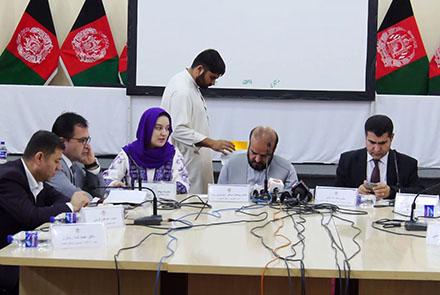Independent Election Commission (IEC) on Sunday issued the preliminary voter lists for Sar-e-Pul, Zabul, Panjsher and Farah provinces - as mainstream Afghan political parties continue to remain skeptical about the transparency of the fast approaching elections.
According to the IEC, work is underway to finalize the voter lists for another ten provinces.
Meanwhile, the head of the IT department of the election commission said that details of over eight million voters have been entered into the IEC database, but that about 100,000 were repeats.
According to the IEC, the details about the identity of 137,983 in Sar-e-Pul, 65,984 in Zabul, 74,789 in Panjsher and 66,457 in Farah were correct.
“Our technical teams are working, God willing, we will announce the list for another ten provinces at the next meeting,” said Sayed Ibrahim Sadat, head of IEC’s IT department.
“We deleted today over 21,626 records in various categories, these categories included repeated names, some under age people and some fake records. Some of them had incomplete information while some others had no date of birth,” said Sadat.
“Exclusive measures which involve special voting centers for women and female staffers will be used for the purpose,” said IEC commissioner Wasima Badghisi.
Last week IEC chief Gulajan Abdulbadi reported that sensitive election material had arrived in the country, adding that the material would be dispatched to 5,100 polling stations across the country.
The IEC initially decided to announce the final voter list on 15 October. But the election commission has decided to announce the voter list in a phased process.
IEC statistics show that just over nine million Afghans have registered to vote across the country.
Government’s political opponents and critics have hit out at the IEC regarding the organization’s claims that nine million Afghans across the country have registered to vote. This came after concerns were raised in the country of widespread ID fraud and ghost voters.
According to the IEC, the commission is in the process of entering the details, of all those who registered, into their database.
Critics however say that as many as five million are in fact ghost voters.
Political parties have called for changes to be brought to the electoral system, the suspension of the voter registration process, rolling out a biometric system for voter registration and declaring each province a single constituency.
On Sunday, Sayyad criticized political parties for closing IEC offices in parts of the country and called on these parties to bring an end to the practice.
Sayyad called on the coalition of political parties to instead share their list of demands with the commission so that a legal solution can be sought.
Speaking at a press conference in Kabul, Sayyad said political parties and observer institutions are not attending IEC meetings nor are they cooperating with the commission – yet they constantly level criticism at the IEC.
“The culture of closing offices must end, and those who are closing offices in the centers and then in the provinces will be responsible for delaying the elections, they do not want to hold elections on time,” said Gulajan Abdulbadi Sayyad IEC chief.
The IEC chief said that in the event of the elections being delayed the commission will not be responsible.
“And those who are closing the offices, they will be responsible for a delay in the elections,” said Sayyad.
This comes after a number of major political parties closed the offices of the Independent Election Commission (IEC) in Balkh, Kandahar and Herat provinces on Saturday over demands for a transparent election and a change in the electoral system.
The political parties that operate under the Grand National Coalition have threatened to also close IEC offices in Nangarhar, Kunduz, Bamiyan, Panjsher, Faryab and Jawzjan provinces if their demands are not met.
Supporters of the coalition established sit-in camps near the IEC office in Balkh on Saturday morning, insisting the demands of the political parties be met, including the use of a biometric system for elections, a change in election system and transparent polls across the country.
According to the Independent Election Commission, over nine million voters have registered their names for the upcoming elections.
At the end of the conference the IEC chief said that so far the commission has entered details of eight millions voters into the data base – 1,072 million are stilled to be entered into the system.



Comment this post